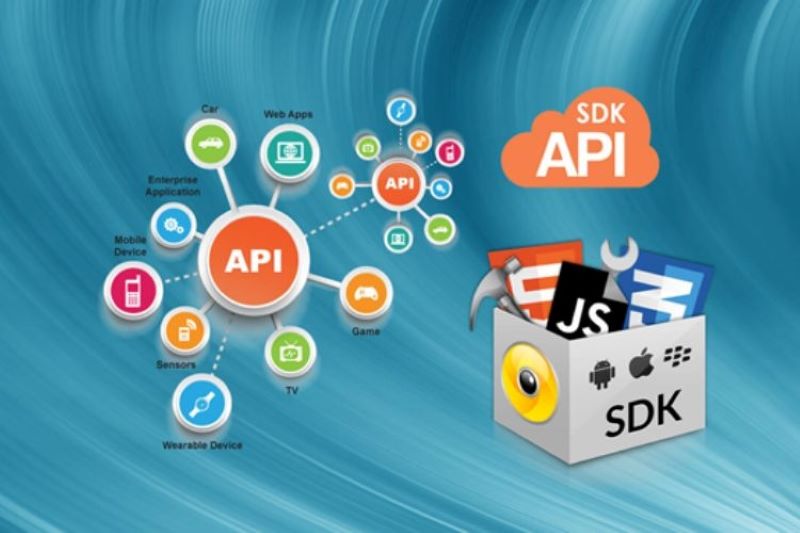What is SDK in crypto? SDK, or Software Development Kit, serves as a crucial tool for developers in the cryptocurrency space, enabling them to build and integrate applications seamlessly. By providing essential libraries, documentation, and tools, SDKs empower developers to create robust crypto solutions, enhancing efficiency and innovation in the rapidly evolving blockchain landscape.
What is sdk in crypto
Definition
An SDK, or Software Development Kit, is a set of software tools designed to help programmers develop applications more efficiently. In the realm of cryptocurrency, SDKs provide essential resources such as code libraries, documentation, and programming tools to build blockchain applications and integrate cryptocurrency functionalities into existing applications. To grasp the significance of SDKs in this context, it’s important to understand “What is SDK in crypto?”
The Role of SDKs in Crypto
- Accelerating the Development Process: SDKs help programmers save time and effort by providing pre-built programming functions, eliminating the need to write code from scratch. This allows developers to focus on building unique features for their applications.
- Easy Integration: With SDKs, integrating features like crypto wallets, cryptocurrency transactions, and smart contracts becomes easier. This is crucial as it helps developers create user-friendly applications without requiring extensive blockchain knowledge. This ease of integration is a key aspect of what is SDK in blockchain.
- Enhanced Security: Many SDKs in the cryptocurrency space are designed with enhanced security measures to protect user data and transactions. Utilizing these SDKs helps minimize the risk of security vulnerabilities that programmers might introduce when developing applications independently.
Applications of SDKs in Crypto
- Crypto Wallets: SDKs are often used to build crypto wallets that allow users to securely store, send, and receive cryptocurrencies.
- Exchanges: Cryptocurrency exchange platforms often use SDKs to integrate trading and payment functionalities.
- Smart Contracts: SDKs can provide the necessary tools to program and deploy smart contracts on blockchain platforms like Ethereum. This functionality is another important element of what is SDK in blockchain.
SDKs in the cryptocurrency space play a crucial role in promoting development and innovation. By providing the necessary tools and resources, SDKs make it easier for programmers to build and integrate cryptocurrency applications, thereby creating high-quality and secure products for users.
The Role of SDKs in Cryptocurrency Application Development
SDKs play a crucial role in cryptocurrency application development by accelerating the development process, minimizing errors, improving security, and providing scalability and cross-platform support. These benefits help developers create high-quality, secure, and engaging products for users in the ever-growing cryptocurrency market. To truly appreciate the impact of SDKs, it’s essential to understand “what is SDK in crypto?”
- Accelerated Development Process: SDKs provide pre-built code libraries and programming functions, saving developers time and effort during development. This allows them to focus on building unique features and user interfaces without worrying about underlying technical complexities.
- Easy Integration: SDKs enable developers to easily integrate cryptocurrency functionalities into their applications, such as incorporating crypto wallets, processing transactions, and deploying smart contracts. This enhances usability and appeal for users. This ease of integration is a key aspect of what is SDK in blockchain.
- Reduced Errors and Improved Security: SDKs are typically developed by experts and have undergone extensive testing, thereby minimizing errors in the code. Additionally, many SDKs come with security measures to protect user information and transactions, creating a more secure environment for the application.
- Scalability: SDKs often allow developers to easily scale their applications. By using available tools and functions, they can add new features or adjust the application to meet market demands without rebuilding from scratch.
- Cross-Platform Support: Many SDKs in the cryptocurrency space support application development across various platforms (web, mobile, desktop), helping developers save time and effort in creating different versions of their applications.
- Documentation and Support: SDKs usually come with detailed documentation and usage guides, making it easy for developers to familiarize themselves with the features and how to use them. Some SDKs also have support communities where developers can exchange ideas and resolve issues.
- Customization: SDKs allow developers to customize functionalities and interfaces according to the specific needs of their project, helping to create a product that best suits business goals and user needs.
Understanding “what is SDK in crypto?” is crucial for appreciating its role in driving innovation and efficiency in cryptocurrency application development. By providing essential tools and resources, SDKs empower developers to create secure, user-friendly, and feature-rich applications that cater to the evolving needs of the crypto market.
Benefits of Using SDKs in Crypto
Utilizing SDKs in the cryptocurrency space not only accelerates the development process but also enhances the quality and security of applications. These benefits empower developers to create better products that meet market demands quickly and efficiently. To truly appreciate these advantages, it’s important to understand “what is SDK in crypto?”
- Time and Effort Savings: SDKs provide pre-built code libraries and tools, saving developers time in coding and testing. This allows them to focus on developing unique features instead of building everything from scratch.
- Easy Integration: SDKs make it easy for developers to integrate functionalities like crypto wallets, transactions, or smart contracts into their applications. This not only saves time but also ensures that these functionalities work correctly and securely. This ease of integration is a key aspect of what is SDK in blockchain?
- Reduced Risks and Errors: SDKs are typically developed and tested by experts in the field, so they tend to have fewer errors. Using SDKs helps minimize security risks and technical issues that may arise during development.
- Improved Security: Many SDKs come with built-in security measures to protect user information and transactions. This is especially crucial in the cryptocurrency space, where security is always a top priority.
- Scalability: SDKs often allow developers to easily scale their applications by adding new features without rebuilding from scratch. This helps applications remain flexible and adaptable to changing needs.
- Cross-Platform Support: Many SDKs are designed to support development across various platforms (web, mobile, desktop), helping developers save time and effort in creating different versions of their applications.
- Documentation and Support Community: SDKs usually come with detailed documentation and guides, making it easy for developers to familiarize themselves with the features and how to use them. Moreover, some SDKs have strong support communities where developers can exchange ideas and resolve issues.
- Customization and Flexibility: SDKs allow developers to customize functionalities according to the specific needs of their project, helping to create the most suitable product for business goals and user requirements.
So, what is SDK in crypto – is crucial for appreciating its role in driving innovation and efficiency in cryptocurrency application development. By providing essential tools and resources, SDKs empower developers to create secure, user-friendly, and feature-rich applications that cater to the evolving needs of the crypto market.
Popular SDKs in the Crypto Space
Understanding “what is SDK in crypto” involves exploring the various tools available to developers. Here are some popular SDKs that are commonly used for building blockchain and cryptocurrency applications:
- Web3.js: This is a JavaScript library that helps connect to Ethereum nodes. Web3.js enables developers to interact with smart contracts, accounts, and transactions on the Ethereum network.
- Ethers.js: A lighter JavaScript library for interacting with Ethereum. Ethers.js provides a simple and easy-to-use API for features like wallet management, transactions, and smart contracts.
- Truffle Suite: A suite of Ethereum development tools that includes Truffle (a framework for developing smart contracts), Ganache (a personal blockchain network), and Drizzle (a library for managing application state).
- OpenZeppelin SDK: This provides secure and standard smart contract libraries for developing decentralized applications. OpenZeppelin SDK makes it easy for developers to build and deploy secure smart contracts. This highlights the security aspect of what is SDK in blockchain.
- Coinbase SDK: This offers APIs that allow integration of Coinbase wallets into applications, enabling users to easily conduct cryptocurrency transactions and manage their assets.
- BlockCypher SDK: This provides APIs to interact with various blockchains such as Bitcoin, Ethereum, Litecoin, and Dogecoin. BlockCypher SDK helps developers build applications quickly without needing a deep understanding of each blockchain.
- Nethereum: An SDK for .NET to interact with the Ethereum blockchain. Nethereum allows .NET developers to build applications and smart contracts on the Ethereum platform.
- Ripple SDK: This SDK enables developers to build applications for the Ripple network, supporting fast and efficient financial transactions on this platform.
- Chainlink SDK: This provides tools and APIs for building decentralized applications that utilize off-chain data. Chainlink makes it easy for developers to integrate real-world data into smart contracts. This integration capability is another important element of what is SDK in crypto.
- Celo SDK: This is designed for developing mobile applications that utilize the Celo blockchain, helping developers build decentralized applications easily and quickly.
These are just a few examples of the many SDKs available in the crypto space. By understanding what is SDK in crypto and exploring the various options, developers can choose the tools that best suit their needs and build innovative and secure applications for the cryptocurrency market.
Understanding what is SDK in crypto is essential for developers looking to streamline the integration of blockchain technology into their applications. SDKs not only simplify complex processes but also enhance the functionality and security of crypto projects. As the blockchain industry continues to evolve, leveraging these tools will be crucial for innovation and development. For more insights on this topic, visit Blockchainbulletinweekly.




